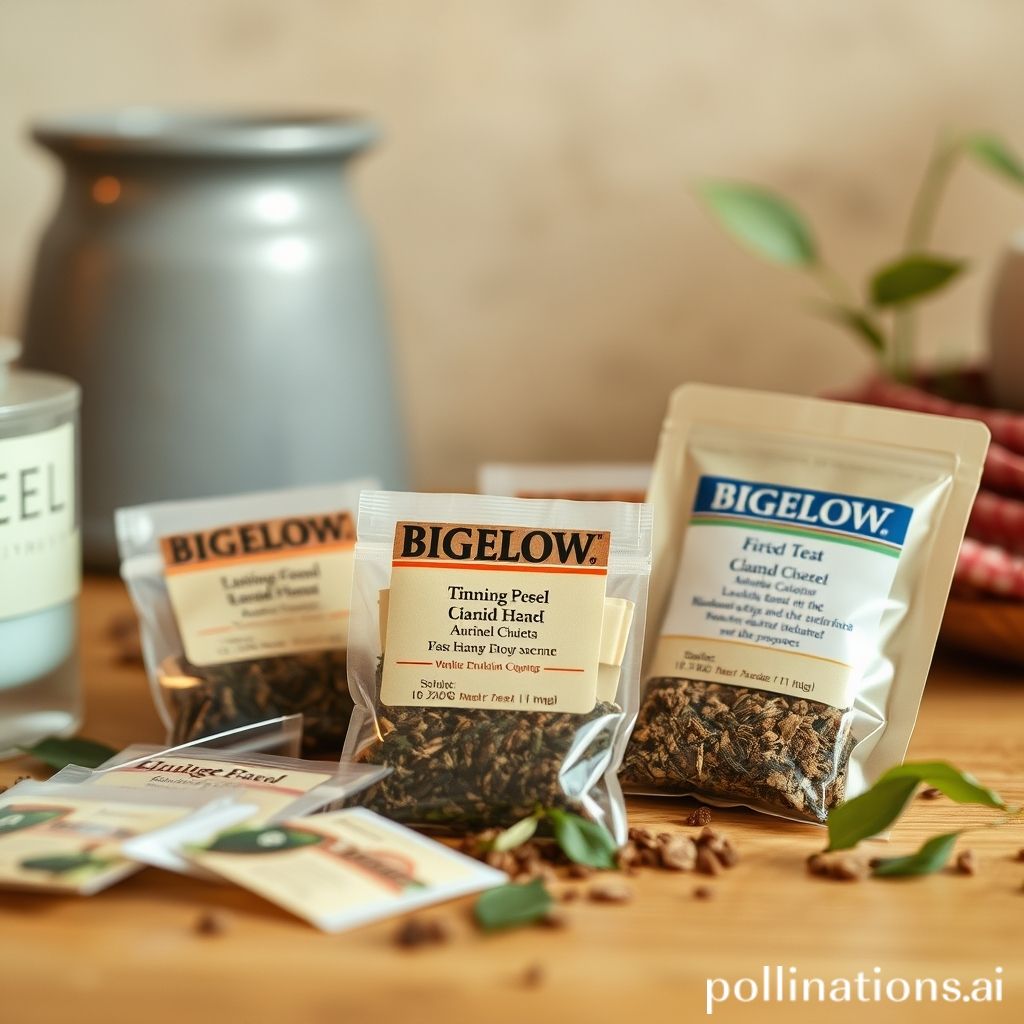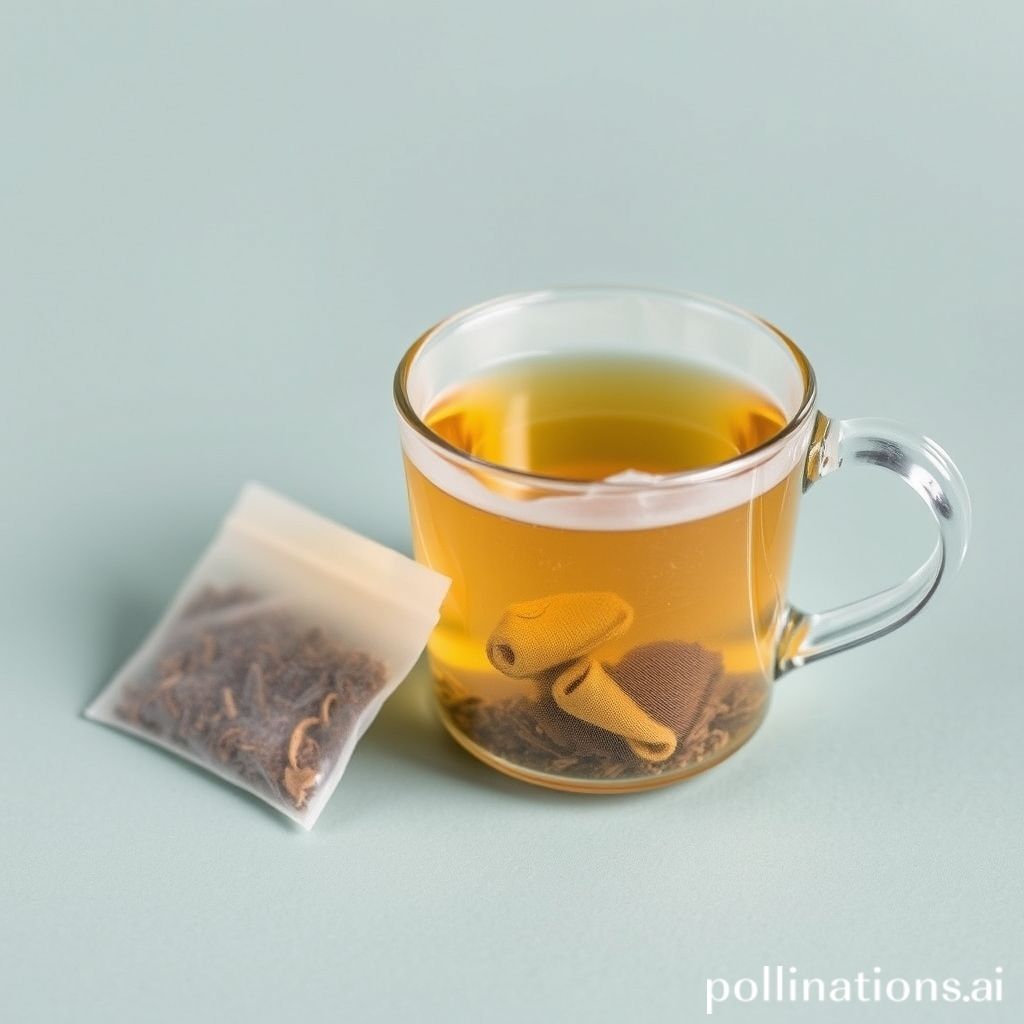Many individuals are curious about whether Bigelow tea bags are plastic-free. They seek answers regarding the composition of the tea bags and their impact on the environment.
As per their search, people are interested in knowing if Bigelow tea bags are made from eco-friendly materials.
Analyzing Bigelow Tea Bags Composition
1. Scrutinizing the Materials Used in Bigelow Tea Bags
In the realm of comprehending the composition of Bigelow tea bags, it is crucial to examine the materials employed. Bigelow tea bags are created using a combination of materials that guarantee both functionality and quality. The primary components include:
- Non-Woven Fabric: Bigelow tea bags are mainly made from non-woven fabric. This material is renowned for its durability and capacity to securely hold tea leaves without tearing.
- Natural Fiber: Along with non-woven fabric, Bigelow also incorporates natural fibers such as cotton or hemp into their tea bags. These fibers are selected for their ability to decompose naturally and their renewable nature.
- Heat-Sealable Filter Paper: To enhance the brewing process, Bigelow uses heat-sealable filter paper in their tea bags. This paper allows for proper infusion At the same time preventing any loose tea leaves from escaping into the cup.
2. Examining the Potential Environmental Impact of Tea Bag Materials
Concerns regarding the environmental impact of tea bag materials have been increasing, leading consumers to search for plastic-free alternatives. Bigelow acknowledges this concern and strives to minimize its environmental footprint. By utilizing non-woven fabric, natural fibers, and heat-sealable filter paper, Bigelow tea bags have a reduced impact on the environment compared to traditional tea bags that may contain plastic elements.
3. Exploring Bigelow’s Dedication to Sustainability
Bigelow Tea is committed to sustainability and actively promotes responsible practices throughout their production processes. They prioritize sourcing materials from suppliers who share their eco-friendly values and are dedicated to reducing waste and energy consumption.
Bigelow also participates in initiatives such as the Ethical Tea Partnership, which ensures fair labor practices and supports the well-being of tea workers. By collaborating with organizations like this, Bigelow demonstrates their commitment to creating a positive impact on both the environment and the communities involved in tea production.

Are Bigelow Tea Bags Plastic-Free?
1. Investigating the Presence of Plastic in Bigelow Tea Bags
Relating to the question of whether Bigelow tea bags are free from plastic, it’s important to explore the materials used in their production. Some tea bags on the market contain a small amount of plastic, which can raise concerns about their impact on the environment.
Conversely, Bigelow tea bags are carefully crafted with natural, plant-based materials, ensuring that they are devoid of plastic. The absence of plastic means that these tea bags can be naturally broken down and turned into compost, making them an environmentally conscious choice for tea enthusiasts.
2. Unveiling the Truth Behind Plastic-Free Claims
With increasing awareness about the detrimental effects of plastic on the environment, many companies have begun making “plastic-free” assertions for their products. But are these claims always accurate?
Bigelow, renowned for its dedication to sustainability, supports its assertion of plastic-free tea bags. The company understands the importance of transparency and ensures that their tea bags undergo rigorous testing to validate their plastic-free status. This commitment to quality and their use of natural materials assures consumers that Bigelow tea bags are genuinely free from plastic.
3. Addressing Concerns About Microplastics in Tea Bags
Even though Bigelow tea bags are free from plastic, some tea drinkers may still have concerns about the presence of microplastics in tea bags. Microplastics are minuscule particles of plastic that can be released into the environment during various processes.
Bigelow acknowledges the significance of addressing these concerns and takes measures to minimize the risk of microplastic contamination. Their tea bags are designed to prevent the release of microplastics, ensuring that your tea remains uncontaminated by these potentially harmful particles.
| Advantages of Bigelow Tea Bags | Environmental Impact | Sustainability |
|---|---|---|
|
|
|
Environmentally friendly alternatives to plastic tea bags
As more individuals become aware of the detrimental impact of plastic on the environment, there is an increasing demand for eco-friendly substitutes to plastic tea bags. This section explores some of the choices available:
1. Exploring biodegradable tea bag options
Biodegradable tea bags are designed to naturally decompose over time, lessening their impact on the environment. These tea bags are typically crafted from plant-based materials, such as cornstarch or PLA (polylactic acid), which are perishable and compostable. They not only eliminate the use of plastic but also offer a sustainable solution for tea enthusiasts.
2. Unveiling compostable tea bag options
Compostable tea bags take the concept of biodegradability a step further. These tea bags are not only fabricated from plant-based materials but are also intended to be composted alongside organic waste. They break down rapidly and enrich the soil, making them an excellent choice for environmentally conscious tea lovers.
3. Considering loose-leaf tea as a plastic-free alternative
For those in search of a completely plastic-free tea experience, loose-leaf tea is an ideal option. By opting for loose-leaf tea, you can bypass the need for tea bags altogether. Simply steep the tea leaves in a reusable infuser or teapot, and enjoy a fresh and flavorful cup of tea without any plastic waste.
3.1. Benefits of loose-leaf tea
- Enhanced flavor: Loose-leaf tea often provides a more robust and authentic taste compared to tea bags.
- Sustainability: By selecting loose-leaf tea, you reduce the amount of packaging waste generated.
- Customizable brewing: Loose-leaf tea allows you to adjust the strength and flavor to suit your preferences.

The advantages of selecting plastic-free tea bags
Plastic waste has become a worldwide concern, with its damaging impact on the environment. Opting for plastic-free tea bags is not only a responsible decision but also offers numerous advantages. Here are some of the reasons why choosing plastic-free tea bags is a wise choice:
1. Decreasing plastic waste and its impact on the environment
Plastic pollution poses a significant threat to the ecosystems of our planet. By selecting plastic-free tea bags, you contribute to reducing plastic waste and minimizing its harmful effects on the environment. Plastic tea bags often contain microplastics that can seep into your cup of tea and ultimately enter our water bodies, affecting marine life and contaminating our natural resources. Plastic-free tea bags help address this issue and promote a cleaner, healthier planet for future generations.
2. Encouraging sustainable and environmentally-friendly consumer choices
Choosing plastic-free tea bags aligns with sustainable and environmentally-friendly consumer choices. These tea bags are typically made from biodegradable or compostable materials such as natural fibers like paper or cornstarch. By using plastic-free tea bags, you actively participate in reducing your carbon footprint and supporting sustainable manufacturing practices. Moreover, many plastic-free tea bag brands prioritize obtaining their ingredients from organic and fair-trade suppliers, ensuring a more ethical and environmentally-conscious tea-drinking experience.
3. Supporting companies that prioritize environmental stewardship
Opting for plastic-free tea bags enables you to support companies that prioritize environmental stewardship. By purchasing tea bags from brands committed to sustainability, you contribute to creating a market demand for eco-friendly products. These companies often invest in research and development to find innovative packaging solutions that are both environmentally friendly and functional. By supporting such brands, you encourage other companies to follow suit, leading to a more sustainable tea industry as a whole.
| Details |
|---|
| Plastic-free tea bags |
| Sustainable consumer choices |
| Reduced plastic waste |
| Environmental stewardship |
Tips for Sustainable Tea Consumption
If you’re a tea lover who cares about the environment, you can make a positive impact by adopting sustainable practices. Here are some tips to help you enjoy your tea In the course of reducing your ecological footprint:
1. Choose Brands That Prioritize Sustainability
When selecting your tea brands, look for companies that prioritize sustainability in their production practices. Consider brands that focus on organic cultivation, fair trade, and ethical sourcing. These companies often use environmentally friendly packaging materials and support sustainable farming methods.
2. Dispose of Tea Bags Properly to Minimize Environmental Impact
Tea bags can contribute to waste if not disposed of properly. In the course of some tea bags are compostable, others may contain non-biodegradable plastic elements. It’s essential to read the packaging or contact the brand to determine the materials used. If the tea bags are compostable, you can dispose of them in your compost pile or green waste bin. For non-compostable tea bags, remove the tea leaves and dispose of the bag in your regular waste bin.
3. Embrace Reusable Tea Infusers and Strainers
One way to reduce waste is by using reusable tea infusers and strainers. These are often made from stainless steel or silicone and can be used with loose-leaf tea. Simply add the tea leaves to the infuser, steep in hot water, and enjoy. Afterward, empty the used tea leaves into your compost or green waste bin, rinse the infuser or strainer, and it’s ready for your next cup of tea. By using reusable tea infusers and strainers, you eliminate the need for single-use tea bags, reducing waste and minimizing your environmental impact.
Conclusion
In terms of making informed decisions about tea bag choices, opting for plastic-free options is crucial. By choosing brands like Bigelow that offer plastic-free tea bags, we can contribute to a more sustainable future.
Plastic pollution is a pressing issue, and every small step we take matters. By using eco-friendly alternatives, we can reduce our environmental impact and help protect our planet for generations to come. Let’s prioritize sustainability and make conscious choices that align with our values. Together, we can create a plastic-free world, one tea bag at a time.
FAQ: Bigelow Tea Bags
FAQ 1: Are Bigelow tea bags made from plastic?
No, Bigelow tea bags are not made from plastic. They are made from a blend of natural fibers, such as paper and plant-based materials.FAQ 2: Can Bigelow tea bags be composted?
Yes, Bigelow tea bags can be composted. Since they are made from biodegradable materials, they can be added to your compost pile or bin.FAQ 3: What are the alternatives to plastic tea bags?
There are several alternatives to plastic tea bags available. Some options include using loose leaf tea with a strainer, using reusable tea infusers or tea balls, or opting for tea bags made from biodegradable materials like paper or cornstarch.FAQ 4: How can I dispose of plastic-free tea bags properly?
To dispose of plastic-free tea bags properly, you can either compost them or dispose of them in your regular trash bin. Make sure to check local guidelines for specific disposal instructions in your area.FAQ 5: Are there any health risks associated with plastic tea bags?
Meanwhile is ongoing research on the potential health effects of plastics leaching into hot liquids, including tea, the overall risk is considered low. Notwithstanding, if you have concerns, it is recommended to opt for tea bags made from natural, plastic-free materials.Read Similar Post:
1. Does Pinalim Tea Make You Poop?
2. What Does Jasmine Tea Taste Like?

